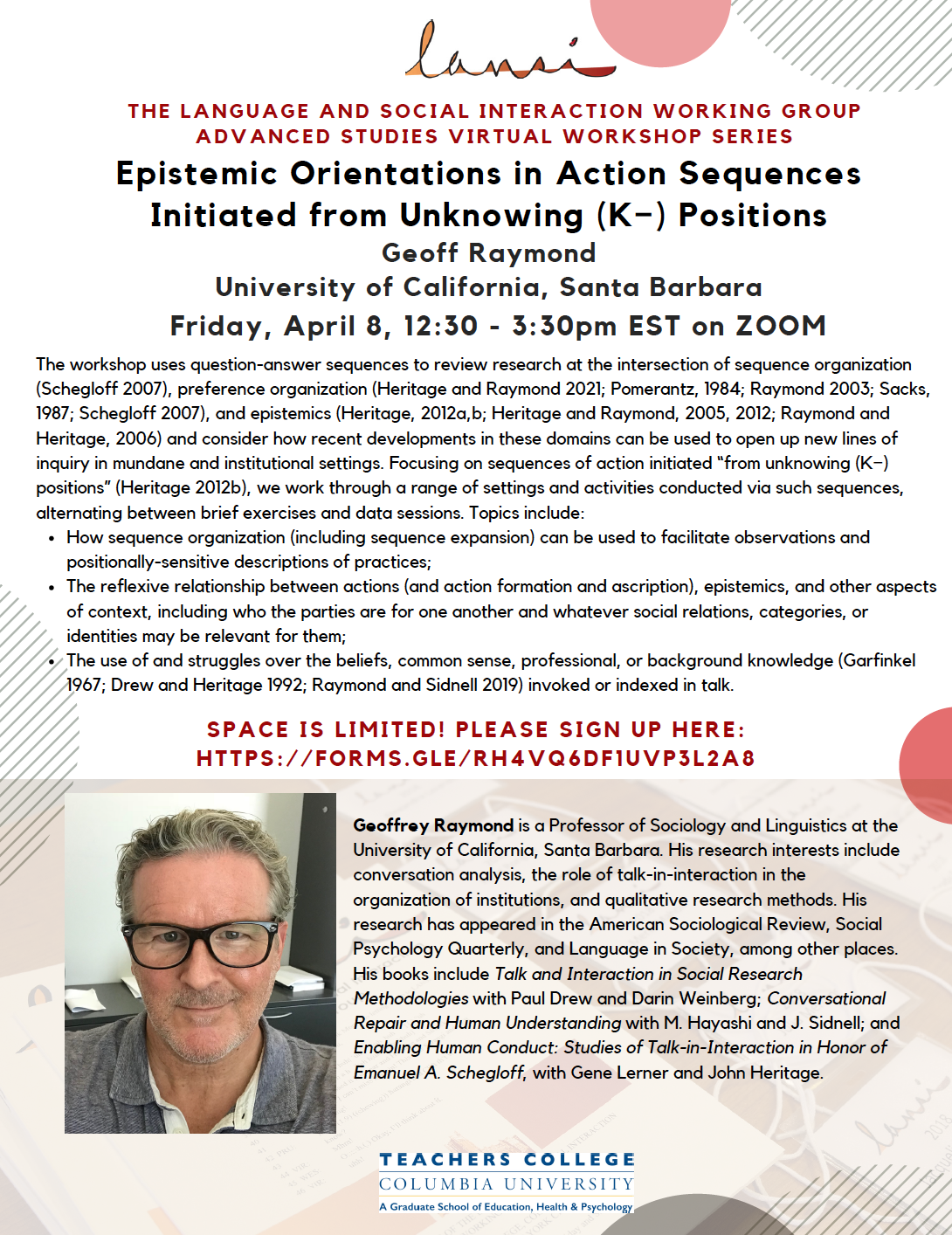LANSI Advanced Studies Virtual Workshop - Epistemic Orientations in Action Sequences Initiated from Unknowing (K-) positions
LANSI proudly presents the LANSI Advanced Studies Virtual Workshop:
Epistemic Orientations in Action Sequences
Initiated from Unknowing (K-) positions
Geoff Raymond
University of California, Santa Barbara
Friday, April 8, 12:30 - 3:30 pm EST via Zoom
Register HERE
Abstract:
The workshop uses question-answer sequences to review research at the intersection of sequence organization (Schegloff 2007), preference organization (Heritage and Raymond 2021; Pomerantz, 1984; Raymond 2003; Sacks, 1987; Schegloff 2007), and epistemics (Heritage, 2012a,b; Heritage and Raymond, 2005, 2012; Raymond and Heritage, 2006) and consider how recent developments in these domains can be used to open up new lines of inquiry in mundane and institutional settings. Focusing on sequences of action initiated “from unknowing (K−) positions” (Heritage 2012b), we work through a range of settings and activities conducted via such sequences, alternating between brief exercises and data sessions. Topics include:
- How sequence organization (including sequence expansion) can be used to facilitate observations and positionally-sensitive descriptions of practices;
- The reflexive relationship between actions (and action formation and ascription), epistemics, and other aspects of context, including who the parties are for one another and whatever social relations, categories, or identities may be relevant for them;
- The use of and struggles over the beliefs, common sense, professional, or background knowledge (Garfinkel 1967; Drew and Heritage 1992; Raymond and Sidnell 2019) invoked or indexed in talk.
Suggested Readings
- Heritage J (2012a) Epistemics in Action: Action Formation and Territories of Knowledge. Research on Language and Social Interaction 45(1). Routledge: 1–29. DOI: 10.1080/08351813.2012.646684.
- Heritage J (2012b) The Epistemic Engine: Sequence Organization and Territories of Knowledge. Research on Language and Social Interaction45(1). Routledge: 30–52. DOI: 10.1080/08351813.2012.646685.
- Heritage J and Raymond CW (2021) Preference and Polarity: Epistemic Stance in Question Design. Research on Language and Social Interaction54(1). Routledge: 39–59. DOI: 10.1080/08351813.2020.1864155.
- Heritage J and Raymond G (2012) Navigating epistemic landscapes:: Acquiescence, agency and resistance in responses to polar questions. In: de Ruiter JPE (ed.) Questions: Formal, Functional and Interactional Perspectives. Language Culture and Cognition. Cambridge University Press, pp. 179–192. DOI: 10.1017/CBO9781139045414.013.
- Raymond G (2003) Grammar and Social Organization: Yes/No Interrogatives and the Structure of Responding. American Sociological Review 68(6): 939–967. DOI: 10.2307/1519752.
- Raymond CW and Heritage J (2021) Probability and Valence: Two Preferences in the Design of Polar Questions and Their Management. Research on Language and Social Interaction 54(1). Routledge: 60–79. DOI: 10.1080/08351813.2020.1864156.
- Schegloff E (2007) Sequence Organization in Interaction: A Primer in Conversation Analysis, Volume 1. Cambridge, UK: Cambridge University Press.
Speakers' Bio:
Geoffrey Raymond is a Professor of Sociology and Linguistics at the University of California, Santa Barbara. His research interests include conversation analysis, the role of talk-in-interaction in the organization of institutions, and qualitative research methods. His research has appeared in the American Sociological Review, Social Psychology Quarterly, and Language in Society, among other places. His books include Talk and Interaction in Social Research Methodologies with Paul Drew and Darin Weinberg; Conversational Repair and Human Understanding with M. Hayashi and J. Sidnell; and Enabling Human Conduct: Studies of Talk-in-Interaction in Honor of Emanuel A. Schegloff, with Gene Lerner and John Heritage.
To request disability-related accommodations, contact OASID at oasid@tc.edu, (212) 678-3689, as early as possible.
